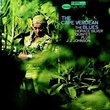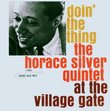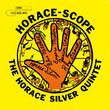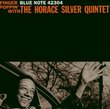| All Artists: Horace Silver Title: Tokyo Blues Members Wishing: 2 Total Copies: 0 Label: Blue Note Records Original Release Date: 1/1/1962 Re-Release Date: 2/24/2009 Genre: Jazz Styles: Soul-Jazz & Boogaloo, Bebop Number of Discs: 1 SwapaCD Credits: 1 |
Search - Horace Silver :: Tokyo Blues
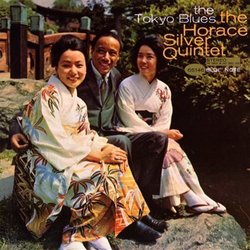 | Horace Silver Tokyo Blues Genre: Jazz
The music for this album was inspired by a recent Horace Silver tour of Japan (an unusual event in 1962). The band is the classic one with Blue Mitchell and Junior Cook, and the compositions are pure Silver. If the Japanes... more » |
Larger Image |
CD DetailsSynopsis
Album Description The music for this album was inspired by a recent Horace Silver tour of Japan (an unusual event in 1962). The band is the classic one with Blue Mitchell and Junior Cook, and the compositions are pure Silver. If the Japanese influence is reflected only in some melodic flavoring and reference to things Japanese in the tune titles, no matter. This is classic Silver at his best with the greatest band he ever led. Remastered by Rudy Van Gelder from the original analog tapes. Similar CDs
|
CD ReviewsAWESOME JAZZ SALUTE TO JAPAN RBSProds | Deep in the heart of Texas | 09/03/2005 (5 out of 5 stars) "Five Stars are nice, but this one deserves Six Stars just to separate it from the rest of the field!! Highly recommended to all jazz fans. My favorite Horace Silver Quintet performance and it is probably resulted from a huge coincidence. Roy Brooks, the regular drummer, was not available and was temporarily replaced by John Harris, Jr and the results are stunning. Harris was a more perfect fit for these latin flavored songs with oriental heads, no disrespect to the awesome Mr Brooks. Engineer Rudy Van Gelder captured Harris' drums with a clarity that has the hi-hat cymbals sizzling with each fall. Ditto for the presense of tenor axe man Junior Cook who was spectacular throughout with a huge tone and excellent inventiveness. Amazing trumpeter Blue Mitchell and solid bassist Gene Harris complete this awesome quintet. "Too Much Sake" is a surprise because, besides the title, it's hard-swinging latin-tinged jazz all the way. Notice how Cook lifts his solo to a new level in mid-flight, firing up the entire group. "Sayonara Blues" begins the real oriental journey and Horace gives it lots of compositional and solo room. "Toyko Blues" has a stunning Mitchell trumpet solo. But this is Horace's group and he solos with aplomb, funk, and angular inventiveness. The marvelous trio performance of "Cherry Blossom" is pure beauty from beginning to end, again with lots of breathing room. Horace shows off his unique approach to piano with a solo full of vaguely familiar quotes and fabulous phrases. "Ah, So" is pure joy with a complex head and lots of strong blowing by all concerned. I consider this CD as the other bookend with Horace's spectacular "Silver's Serenade" with Joe Henderson on Tenor Sax. "Song For My Father" was great, but "Tokyo Blues" and "Silver's Serenade" are toppers. Six Stars for "Toyko Blues". An Essential CD." Good, but not essential Silver Stan J. | Boston MA | 01/03/2003 (4 out of 5 stars) "This was an interesting attempt by Silver to release a thematic record organized around an East Asian theme (the group had just returned from a successful Japanese tour), although it's questionable how authentic the Asian treatment is, and the solos are pretty much straight ahead hard bop. John Harris Jr. does a fine job filling in for Roy Brooks on drums - his creativity reminds me of Art Blakey, except he is less loud and doesn't dominate the overall sound. For example, listen to his playing behind the piano solo on "Tokyo Blues". The best song is "Ah! So", which features a complicated bebop line played out of time, with the rhythm section returning to support the solos. I give it four stars because there were only 5 tunes (one, "Cherry Blossom" is a pretty ballad written by a friend of Horace's), and while Mitchell and Silver deliver very good solos, it's not their best on record. However tenor player Junior Cook absolutely sizzles on this date, he sounds nothing like Hank Mobley who may have been one of his early influences." Silver's Ode to Japan Michael B. Richman | Portland, Maine USA | 10/28/2000 (5 out of 5 stars) "As the review below states, "The Tokyo Blues" is one of Horace Silver's best albums. But with all due respect to Mr. Jones, let's write reviews that tell the people a little bit more about the CD they are thinking about buying. Recorded in July 1962, six months after a successful and impressionable tour of Japan, "The Tokyo Blues" is Silver's way of saying thank you for the generous hospitality he received while on the other side of the Pacific. Each of the disc's five tunes has a title that refers to an aspect of Japanese culture or tradition. But don't think Silver went so far as to incorporate Japanese music on this album, for this is classic hard bop from one of the masters of the genre. The band here is the famous Quintet of 1959-63 (Blue Mitchell on trumpet, Junior Cook on tenor sax, Gene Taylor on bass) with one exception -- John Harris Jr. replaces Roy Brooks on drums, who was ill at the time of this session. While "The Tokyo Blues" may not quite live up to "Song For My Father," it is as good as anything else this quintet cut, including "Silver's Serenade," "Finger Poppin" and "Blowin' The Blues Away.""
|

 Track Listings (5) - Disc #1
Track Listings (5) - Disc #1